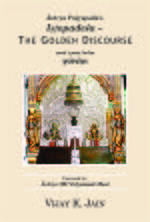Pujyapada
- Madhava Bhatta (father)
- Shridevi (mother)
- Durvinita
| Part of a series on |
| Jainism |
|---|
 |
|
| Philosophy
|
| Ethics Ethics of Jainism
|
| Jain prayers |
| Major figures
|
| Major sects |
| Festivals |
| Pilgrimages |
|
|
Acharya Pujyapada or Pūjyapāda (464–524 CE)[1] was a renowned grammarian and acharya (philosopher monk) belonging to the Digambara tradition of Jains. It was believed that he was worshiped by demigods on the account of his vast scholarship and deep piety, and thus, he was named Pujyapada. He was said to be the guru of King Durvinita of the Western Ganga dynasty.[2]
Life
Pujyapada is said to have lived from 510 CE to 600 CE.[3] Born under the name Devanandi to parents Madhava Bhatta and Shridevi,[4] he was a sadhu Digambara monk, as well as a yogi, mystic, poet, scholar, author and master of several branches of learning.[5] As the Devs from heaven used to come to do Puja of his feet Paad, the title of Pujyapaad was given to him. [6] He was heavily influenced by the writings of his predecessors like Acharya Kundakunda and Acharya Samantabhadra. He is rated as being the greatest of the early masters of Jain literature.[7] He was prominent preceptor, with impeccable pontifical pedigree and spiritual lineage. All of his work was written in Sanskrit, in prose as well as verse form.[8] He was pontiff of the Nandi sangha, which was a part of the lineage of Acharya Kundakunda. He was the tenth guru of the pontifical lineage of the Nandi Sangha. He was born in a Brahmin family of Karnataka.[3]
It is likely that he was the first Jain saint to write not only on religion but also on non-religious subjects, such as ayurveda and Sanskrit grammar. Acharya Pujyapada, besides being a scholar on Jainism and a mendicant walking in the footsteps of the Jinas, was a grammarian,[9] master of Sanskrit poetics and of ayurveda.[citation needed]
Pujyapada gave the definition of Dāna (charity) as the act of giving one's wealth to another for mutual benefit in Sarvarthasiddhi.[10]
Works

- Iṣṭopadeśa (Divine Sermons) – It is a concise work of 51 verses.[11] It deals with the real and ethical aspects of life using examples from our day to day lives. Acharya Pujyapada adumbrates the spiritual requirements that would transform our mundane lives into the sublime. Pujyapada differentiates between the important and the trivial, the essential and the non-essential and explains how the soul is different from its mortal coil. He goes a step further and explains that without realizing the essential difference between the eternal, i.e. the soul and the mutable, i.e. the body, all the devotion and all the meritorious deeds one performs shall not lead to liberation.
- Sarvārthasiddhi (Attainment of Higher Goals) - Sarvārthasiddhi is a commentary on the Tattvārthasūtra, marked by precision and conciseness.[9][11][6] It serves as the definitive mula patha for all Digambara works on the Tattvārthasūtra. Sarvārthasiddhi is the earliest surviving commentary on the Tattvārthasūtra,[9] since an even earlier commentary, the Gandhahastī Mahābhāṣya of Acharya Samantabhadra, is no longer available. Not even the famed Jain manuscript libraries, known as Grantha Bhandara, have a copy of the Gandhahastī Mahābhāṣya.
- Jainendra Vyākaraṇa (Jainendra Grammar) - Jainendra Vyākaraṇa deals with Sanskrit grammar and is considered to be one of the finest early works on Sanskrit grammar.[6]
- Samādhitantra (Method of Self-Contemplation) – It is a treatise on yoga and adhyatma, outlining the path to liberation through differentiation of the soul from the body. This is a short work, succinctly written, with 106 verses.
- Daśabhaktyādisangraha (Collection of Ten Adorations) - a collection of the adoration of the essentials that help the soul in acquiring merit. The essentials include the Supreme Beings, the Scripture, the Perfect Conduct, and the sacred places like the Nandīśvara Dvīpa.[12]
- Śāntyāṣṭaka (Hymn in Praise of Śāntinātha) - A poem of 8 verses in adoration of Bhagavān Śāntinātha, the 16th Tīrthankara.[12]
- Śabdāvatāranyāsa (Arrangement of Words and their Forms) - A work on Sanskrit grammar, said to be a gloss on Pāṇinī
- Jainābhiṣeka (Jain Anointment) - A work on Jain rituals.
- Chandaśāstra (Treatise on Prosody) - A work on Sanskrit prosody.
References
Citations
- ^ Jain, Jyoti Prasad (2005), The Jaina Sources of the History of Ancient India (Second ed.), p. 102
- ^ "Jaina Antiquary". Volume XVIII.1, pp 13-15.
- ^ a b Natubhai Shah 2004, p. 49.
- ^ Introduction. Jain, Jaykumar.Samadhitantra. First edition, 2006.
- ^ Page 98, Ibid.
- ^ a b c Upinder Singh 2008, p. 524.
- ^ Page 98, Jain, Jyoti Prasad. The Jaina Sources of the History of Ancient India. Second, revised edition: 2005.
- ^ Page 98, Ibid.
- ^ a b c Balcerowicz 2003, p. 29.
- ^ Ram Bhushan Prasad Singh 2008, p. 84.
- ^ a b Jain 2014, p. xiv.
- ^ a b Jain 2014, p. 15.
Sources
- Balcerowicz, Piotr, ed. (2003) [2002], Essays in Jaina Philosophy and Religion, Motilal Banarsidass, ISBN 81-208-1977-2
- Jain, Vijay K. (2014), Acarya Pujyapada's Istopadesa – The Golden Discourse, Vikalp Printers, ISBN 9788190363969
- Shah, Natubhai (2004) [First published in 1998], Jainism: The World of Conquerors, vol. I, Motilal Banarsidass, ISBN 81-208-1938-1
- Singh, Ram Bhushan Prasad (2008) [1975], Jainism in Early Medieval Karnataka, Motilal Banarsidass, ISBN 978-81-208-3323-4
- Singh, Upinder (2008), A history of ancient and early medieval India : from the Stone Age to the 12th century, New Delhi: Pearson Education, ISBN 978-81-317-1120-0
Further reading
- Jain जैन, Vijay Kumar विजय कुमार (2022). Ācārya Pūjyapāda’s Bhakti Saṃgraha – Collection of Devotions आचार्य पूज्यपाद विरचित भक्ति संग्रह. Dehradun: Vikalp Printers. ISBN 978-93-5627-523-2.
- Jain, Vijay K. (2017). Ācārya Pūjyapāda’s Samādhitantram आचार्य पूज्यपाद विरचित "समाधितंत्रम्. Dehradun: Vikalp Printers. ISBN 978-81-932726-0-2.














